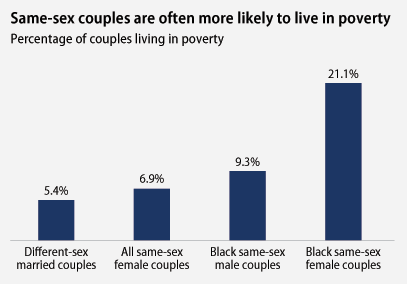Adm. Michael Mullen, chairman of the Joint Chiefs of Staff, testified earlier this month before the Senate Armed Forces Committee about his “personal belief” that repealing the “Don’t Ask, Don’t Tell” ban on openly gay men and lesbians was “the right thing to do.” It is commonly recognized that the ban, which has discharged nearly 14,000 qualified and patriotic Americans, is discriminatory against gays and lesbians. Admiral Mullen addressed this, also disclosing that he has served with gays and lesbians since he began his service in 1968, and that “[e]verybody in the military has, and we understand that.”
What is less well known is the disproportionate effect that “Don’t Ask, Don’t Tell” has on racial and ethnic minorities, and women of all races.
Defense Department statistics uncovered by the Palm Center reveal that 30 percent of all 2008 discharges under “Don’t Ask, Don’t Tell” were women, despite the fact that women made up only 14 percent of the armed forces (this data is from the Army, Navy, Air Force, and Marines). Women in the Army were especially likely to be discharged. Only 14 percent of soldiers are women, but women made up 36 percent of those discharged under the ban.
People of color were also disproportionately affected by DADT, although to a lesser extent than women. Whites made up 71 percent of the Army, Navy, Air Force, and Marines in 2008, but accounted for only 64 percent of DADT discharges. Specific racial differences varied considerably based on specific service branch and race, with African Americans in the Air Force having the largest gap between overall population and DADT discharges.
Pentagon data released to the Servicemembers Legal Defense Network tells a similar story for ethnicity. Hispanic servicemembers were 1.4 times more likely to be dismissed than their non-Hispanic peers. And about one-fifth of the Navy’s DADT discharges were Hispanic, but Hispanics only represented 14 percent of the Navy’s forces in 2008.

These numbers are particularly alarming considering that many people enlist in the armed forces because it provides them with employment and educational opportunities they would not have otherwise. Gay men of color and lesbian women are particularly in need of this kind of economic opportunity.  Research by the Williams Institute has shown that same-sex female couples and same-sex African-American couples of either gender are more likely to live in poverty than similar different sex couples.
Research by the Williams Institute has shown that same-sex female couples and same-sex African-American couples of either gender are more likely to live in poverty than similar different sex couples.
Repealing the “Don’t Ask, Don’t Tell” ban is more than an issue of military readiness or sexual orientation. It is also an economic issue, a race issue, and a gender issue. Ending DADT will level the playing field for thousands of gay and lesbian men and women—especially men and women of color—who volunteer to serve their country but face discharge due to nothing more than long-standing prejudice.
Read also:
Josh Rosenthal is Special Assistant to the External Affairs Department and Christopher Contreras is an intern at American Progress.